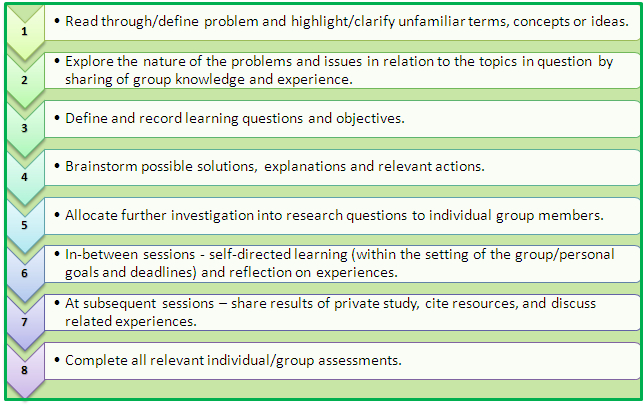What is Problem-Based Learning?
Problem-based learning (PBL) is a student centred instructional strategy in which students collaboratively solve problems and reflect on their experiences. PBL may be described as a ‘socially constructed pedagogy’ as all participants are collectively involved in a shared process of constructing knowledge. Students are encouraged to exchange ideas, feelings, experiences, information and insights, to tease out and define the limits of their existing knowledge and together actively build a new level of understanding that is greater than could be achieved individually.
The PBL format
During PBL sessions lecturers and teachers become the ‘facilitators’ and monitors of group learning, on hand to provide guidance, support and information and ensure discussions remain relevant. Students are introduced to a challenging and open-ended problem, scenario or trigger and in groups will roughly work through the following process:

Novel features of PBL
- Levels of instruction from facilitators vary from course to course and institution to institution; from one end of the spectrum where students are free to define their own problem scenarios to more structured ‘projects’ with guidelines.
- Students guide the course of their own learning sessions (within limits and with academic guidance) rather than following more rigid outlines.
- PBL focuses on organizing the content of modules around problem scenarios rather than around specific topics or disciplines.
- PBL involves the treatment of curricula content and the actual process of learning as an integrated whole.
- PBL’s novel features make it the ideal vehicle for the integration of academic content with the natural acquisition and development of both discipline specific and transferable life skills.
PDF version available
This file may not be suitable for some users of assistive technology
Request an accessible format
Problem based learning - part 1
This video mini-lectures describes problem-based learning. Dr. Andy Johnson, www.OPDT-Johnson.com

